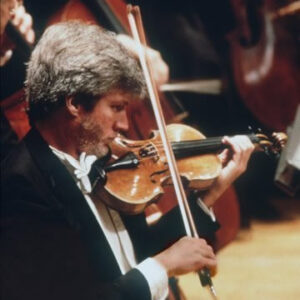
Charles Underwood
Violin
Having joined the Orchestra in 1975, BSO violinist Charles Underwood answers some of the most common questions he’s received during his 40 + year career with the Orchestra.
“How did you become a classical musician? Do you come from a musical family?”
Many musicians do, but my parents weren't musicians -- or even college educated. My career path was a struggle. My family had little money, and I'm from a small, uncultured community of about 18,000 people, where there was almost no opportunity for an aspiring classical musician. The Pittsburgh Symphony was a major orchestra fifty miles away, but I never had the opportunity to attend their children’s concerts, or rarely any other type of performance. I'm sometimes asked about my high school orchestra. My answer: There was none. My school system was mostly about sports. I once complained to my high school principal about this, and his response was that I could play in the school’s marching band. I informed him that violins don't play in marching bands. “Well it’s just like playing the trumpet – you change fingers to get the different notes,” he explained.
“What else might you have done professionally?”
I have many interests; I'm bilingual French/English; and might have pursued a career in writing, and perhaps broadcast journalism. Or maybe I'd have been a comedy writer/humorist, or actor, among other possibilities.
“What surprises have there been during your career?”
Shortly after I became a member of the Orchestra, I was elected to the BSO “Players’ Committee” – a small group of Musicians who represent their colleagues to the Union, management, the press, and the public. I spent at least 13 years on that committee, and was involved in five consecutive management/Musician contract negotiations. This was unexpected, and indescribably fulfilling.
“What interests do you have other than your work?”
Many - including the human body, and how it interacts in concert – or in conflict -- with the forces of nature. I'm very physical and athletic, and am particularly fond of extreme activities. My athletic endeavors have included, among other things, tennis, scuba diving, skiing, and trapeze. I also practice Yoga, and find Yoga inversion postures especially interesting. I see them as unnatural -- humans usually support themselves by their feet. I like breaking rules.
“Does this rule breaking extend to participating in extreme activities?”
Yes, I jump from bridges hundreds of feet high – backwards or forward -- with one or both ankles attached to a bungee cord. As with playing the violin, I try to do so with proficiency, accuracy, elegance, and skill. This means, for example, good form and body alignment.
“Bungee Jumping? You can't be serious. Even small injuries could end your career.”
Yes, there have been sprains, back problems, dislocations, and eye issues from bungee jumping. Or a jumper can panic, grab something he shouldn't touch, then injure his hand or a finger, but these problems are infrequent, especially for someone athletic. It’s intense, and – again -- I get to break the rules of human nature – humans were not programmed to jump 500 feet toward the ground. I'd also like to learn to be shot from a circus cannon, but that seems unlikely; the circus schools don't teach it.
“What is your primary goal in the BSO?”
Our primary objective never changes – it’s to make music – and to do so at the highest possible level of excellence.
“Do you have any advice for aspiring performing artists, or perhaps anyone wishing to become successful in any profession?”
Work hard and be nice to people.
To see Charles jump from the top of a 720 foot high dam in Switzerland, click on the video below. (And if one day – perhaps after summer vacation – this insatiable thrill seeker’s thick crop of silver gray hair is no longer visible beneath the stage lights when the new BSO season begins, we'll all know what happened.)